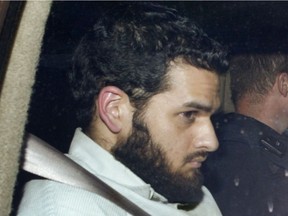"Undue Risk to Society"
 |
"Your current convictions are very serious as they are related to planned and widespread violence. The nature of these offences suggests you have the potential to cause serious harm to many people should you return to your offence cycle, and reoffend.""Previously, and as recently as your last board hearing, you denied this was its intended function. You also acknowledged that you were aware that you were contributing to terrorism or violence, which you previously denied.""Tying these two things together, you indicated you were aware that the people you were associating with were likely to use the device for violent purposes, even if you were not specifically aware of any plans. This increased accountability marks an important turning point that will enable further progress."Parole Board of Canada
Momin Khawaja of Ottawa was the first person ever to be convicted under Canada's Anti-Terrorism Act. The Parole Board of Canada has now denied Khawaja's latest application for parole, on the basis that in their considered opinion, given all the evidence against the man, he represents still -- even after over 19 years behind bars -- presents as an an "undue risk to society".
Now 44 years of age, Khawaja has been in custody since March of 2004, at a time when he worked on contract as a software developer at Canada's Department of Foreign Affairs, where he was arrested and charged with seven offences related to terrorism. He was convicted at trial on five counts and given a life sentence, connected to his role in an al-Qaeda-inspired plot to bomb United Kingdom targets.
He was allied with five British men who, for their part in the terrorist strategy were given life sentences in Britain, in connection with the same plot to build and detonate fertilizer bombs. According to federal prosecutors, Khawaja had been part of the plot, his role was to build a radio-frequency device for the purpose of detonating the bombs remotely.
A November 2021 psychological risk assessment concluded that Khawaja remains at moderate-to-high-risk for the potential to commit another terrorism-inspired offence, while for any other type of criminal activity he falls into a low-risk category. Khawaja completed a sociology degree while in prison and under the direction of an imam studied Arabic and religion.
There were six security incidents he was involved in during his time in prison; refusing to comply with direct orders, and aggressive behaviour exhibited toward staff. "Some incidents required physical intervention and the use of chemical agents", noted the board. In March 2015 he was transferred to a new federal facility and since then moved to a medium-security prison, living in a "responsibility-based unit".
These units typically are comprised as a pod of ten inmates sharing a common area, washroom and kitchen for the preparation of their own meals. Khawaja's mental health is a concern; while alone in his cell he is occasionally given to fits of shouting and swearing, and alleging he was tortured by an outside agency, but he has refused mental health services "so these difficulties could not be properly assessed".
The board admitted it is difficult to assess whether Khawaja's belief system has been altered in his time behind bars. "This is in partly due to the fact that, during your [parole] hearing, you yourself had a hard time articulating changes in your religious convictions and tended to intellectualize, distance and to speak in vagaries about your beliefs, past and present", stated the board during Khawaja's hearing.
During the original investigation, prosecutors were reliant on Khawaja's voluminous emails as proof he was a committed Islamic jihadist, idolizing Osama bin Laden, mastermind of the 9/11 attacks. Khawaja praised the September 11 plane hijackers as "effective and honourable" economic jihadists. Khawaja was convicted by Justice Douglas Rutherford on five terrorism counts in the absence of enough evidence to prove he was aware his detonator would be used against civilian targets.
Originally sentenced to ten-and-a-half years in prison, the Court of Appeal for Ontario ruled that penalty inadequate, replacing it with a 24-year sentence. Born in Canada, Khawaja lived in Libya, Pakistan and Saudi Arabia, then returned to Ottawa. He travelled to Pakistan in 2002 for weapons training and "provided financial support and technical training and transported supplies for the group" according to the Ontario Court of Appeal. In his emails at the time he wrote that Osama bin Laden was "the most beloved person to me", that he wanted to "contribute as best as possible to the destruction of the enemies of Allah."
 |
| Momin Khawaja |
Labels: Canada's First Islamist Terrorist Conviction, Denial of Parole, Momin Khawaja, Parole Board of Canada

0 Comments:
Post a Comment
<< Home